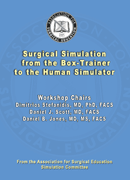Surgical Simulation from the Box-Trainer to the Human Simulator
Dimitrios Stefanidis, MD, PhD, FACS; Daniel J. Scott, MD, FACS; Daniel B. Jones, MD, FACS

| Product Details | |
| Product ID: | ASE100 |
Simulators are playing an increasingly important role in surgical education. They allow repetitive and deliberate practice in a safe and nonthreatening environment, enabling trainees to overcome the learning curves of new skills and procedures before applying them to patient care. They also provide an invaluable educational resource for experiential learning, objective performance assessment, and team training. Realizing the importance of training outside the OR, the APDS recently released the national skills curriculum for resident training that is based on simulators. In addition, the Surgery Residency Review Committee (RRC) has mandated that every General Surgery residency training program must have a skills lab or access to one and the ACS has established a formal accreditation process and certification for simulation centers with the ultimate goal to enhance patient safety. Nevertheless, the implementation of skills training and simulation into the surgical curriculum may pose considerable difficulties to those unfamiliar and may require significant resources.
This workshop, presented during Surgical Education Week 2009, aims to provide a lecture format that will stimulate discussion guidelines for running a successful skills laboratory, for implementing effective skills curricula and augmenting them, for incorporating patient simulation and team training into the surgery curriculum. The Educational Institute requirements of the American College of Surgeons are referenced, the modules of the APDS national skills curriculum are presented and the resources and personnel needed are identified.
DVD 1: Procedural Simulation
- Task Trainers and Procedural Simulators - Shawn T. Tsuda, MD
- Procedural Skills Assessment in the Simulation Center. What Metrics Work? - James R. Korndorffer, Jr, MD, FACS
- Fundamentals of Skills Curricula - Dimitrios Stefanidis, MD, PhD, FACS
- The APDS National Skills Curriculum - Gary L. Dunnington, MD, FACS
- Running a Successful Skills Training Center - Daniel J. Scott, MD, FACS
- ACS Educational Institutes Accreditation Requirements - Daniel B. Jones, MD, MS, FACS
- What Does the Future Hold for Simulation-Based Training? - Gerald M. Fried, MD, FRCSC, FACS
DVD 2: Team Training
- From Simulators to Simulation - Russell D. Dumire, MD, FACS
- Performance Assessment - Kinga Powers, MD, PhD, FACS
- The Power of Debriefing - Giselle G. Hamad, MD, FACS
- Team Dynamics in Surgery - Nancy J. Hogle, BSN, RN, MS
- Phase III of the APDS Curriculum - James S. Gregory, MD, FACS
- The Challenges of Team Training - John T. Paige, MD, FACS
- Surgical Simulation: What Does the Future Hold? - Neal E. Seymour, MD, FACS



